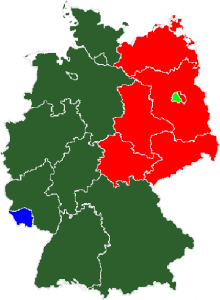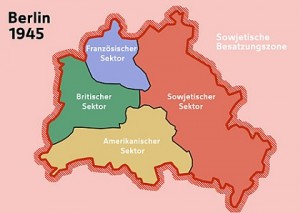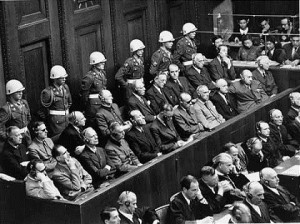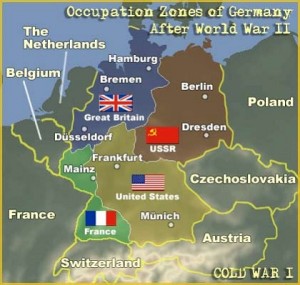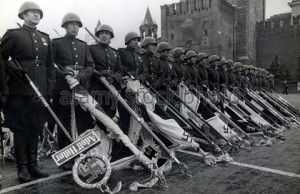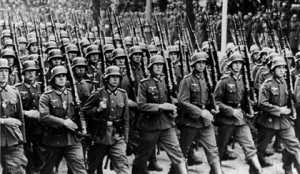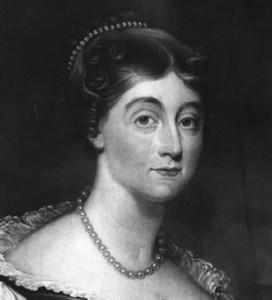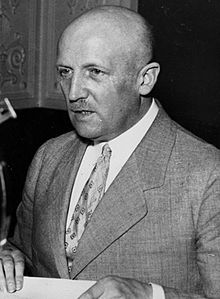Participants at the Potsdam Conference had agreed that the foreign ministers of the four victorious powers should meet to implement and monitor the conference's decisions about postwar Europe. During their fifth meeting, held in London in late 1947, prospects for concluding a peace treaty with Germany were examined. Following lengthy discussions on … [Read more...]
The Creation of the Bizone
By early 1946, the Western Allies--the United States and Britain in particular--had become convinced that Soviet expansionism had to be contained. The Soviet Union's seizure of Polish territory and the drawing of the Oder-Neisse border (which gave formerly German territory to Poland), its antidemocratic actions in other countries occupied by Soviet … [Read more...]
Postwar Political Parties in Germany and Democratization
The reintroduction of democratic political parties in Germany was one of the primary concerns of the Allies during the final phase of the war. The Soviet authorities were the first to reestablish political parties in their zone. They ordered the formation of political parties on June 10, 1945, well before such a directive was issued in the Western … [Read more...]
The Nuremberg Trials and Denazification
The Allies agreed that Germany should never again have the opportunity to destroy European peace as it had in the two world wars. A principal aim of the Allies was to prevent the resurgence of a powerful and aggressive Germany. As a first step toward demilitarizing, denazifying, and democratizing Germany, the Allies established an international … [Read more...]
Postwar Occupation and Division of Germany
On May 8, 1945, the unconditional surrender of the German armed forces (Wehrmacht) was signed by Field Marshal Wilhelm Keitel in Berlin, ending World War II for Germany. The German people were suddenly confronted by a situation never before experienced in their history: the entire German territory was occupied by foreign armies, cities and … [Read more...]
World War II – Defeat
In June 1944, American, British, and Canadian forces invaded France, driving the Germans back and liberating Paris by August. A German counteroffensive in the Ardennes began in late December was beaten back after heavy fighting in what became known as the Battle of the Bulge. Soviet troops, meanwhile, advanced from the east. Western forces reached … [Read more...]
Total Mobilization, Resistance, and the Holocaust in Germany
Once it became clear that the war would not be a short one, Germany's industry was reorganized for a total mobilization. Between February 1942 and July 1944, armaments production increased threefold despite intense Allied bombing raids. Much of the labor for this increase came from the employment of some 7 million foreigners, taken from their … [Read more...]
April 8 in German History
April 8, 1586 Death of Martin Chemnitz in Braunschweig, Germany. A leading Protestant theologian, Chemnitz did much to unify the Protestants in the early Lutheran church. April 8, 1695 Birth of Johann Christian Günther in Striegau, Germany. Günther was one of the leading lyric poets of the age. He made the transition from the Baroque to … [Read more...]
April 7 in German History
April 7, 1250 Death of St. Hermann Joseph von Steinfeld. St. Hermann Joseph was born in about 1150 in Cologne, Germany. His contemporary biographer relates that he was dedicated to the Blessed Virgin from his youth on. Many charming legends are told of his youthful dedication to Mary. At age 12 he entered the monastery at Steinfeld, Germany … [Read more...]
April 6 in German History
April 6, 912 Death of Bl. Notker Babulus (der Stammler)(ca. 840 - 912). Blessed Notker was born near St. Gallen, Switzerland in about 840. He studied at the school of the Monastery of St. Gallen and became a monk there. He wrote a large number of works during his lifetime as a teacher at the monastery school. He was beatified in 1512 by Pope … [Read more...]
- « Previous Page
- 1
- …
- 104
- 105
- 106
- 107
- 108
- …
- 139
- Next Page »
